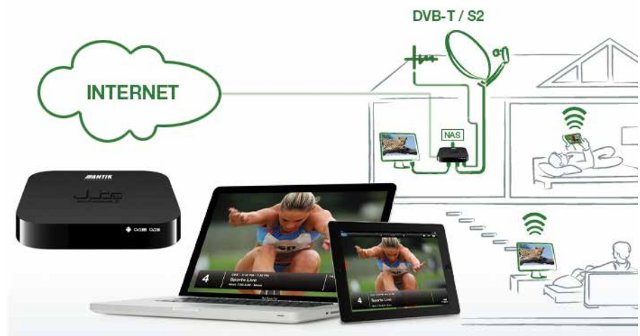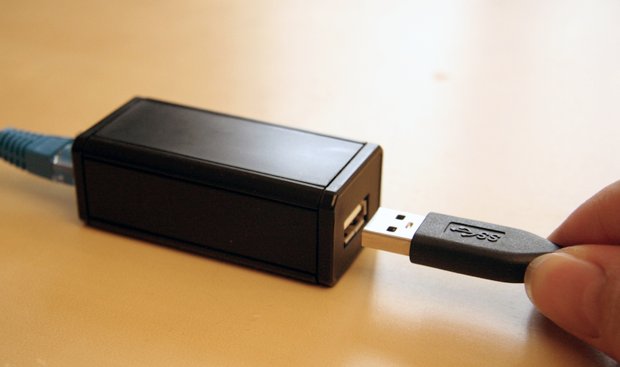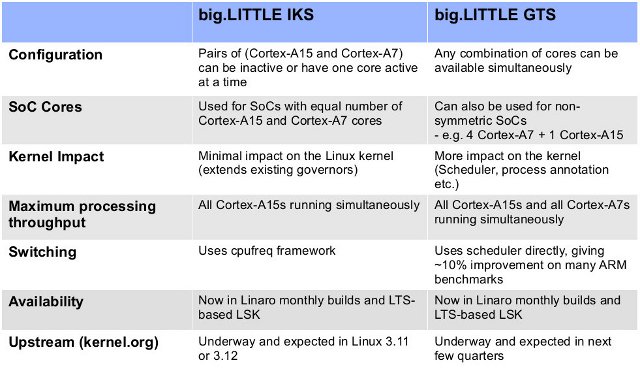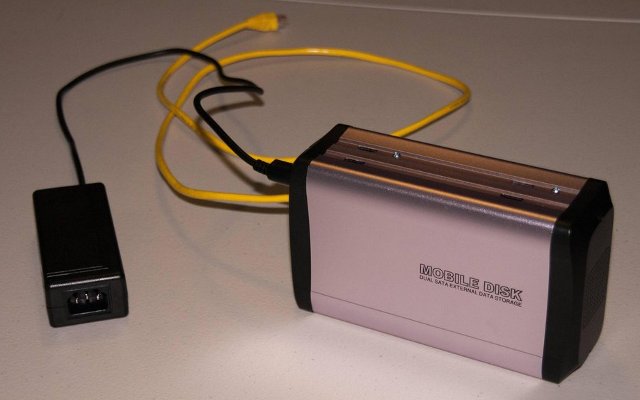Antik Technology, a Slovakia based company, has developed a Android set-top-box powered by STMicro StiH416 SoC. I wrote about the StiH416 development platform previously, and although it’s just a dual core Cortex A9 SoC, its video capabilities are impressive as it supports multiple simultaneous video decoding streams. The set-top box called Juice Extreme 2 leverages those capabilities with 4 DVB tuners (DVB-T or DVB-S2) that provide four different streams, and transcode them, to all video playback devices around your home such as TV, PC, tablet and smartphones, or record them to an internal SATA drive. JUICE EXTREME 2 key features: SoC – STMicro STiH416 (Orly) dual core Cortex A9 @ 1.2 GHz + ARM Mali 400MP4 GPU System Memory – 2 GB DDR3 Storage – 1 GB Flash + internal SATA connector + SD card slot Video: Quadruple DVB Tunner CVBS/Y Pb Pr (3.5mm jack) Tuner board connector RF IN/OUT […]
$79 Plug Makes Creating Your Own Cloud Easy
The “Plug” is a device with an Ethernet connection, and a USB port that allows you to connect up to 8 USB drives, and access those in a unified fashion from all your devices. It’s a bit like dropbox, except you are in charge, and the price per GB is much cheaper than cloud services. The Cloud Guys have launched a kickstarter campaign that has already received over $220,000 in pledges after just over two days. The Plug technical specifications are as follows: OpenWRT based Embedded Linux x86 compatible processor Port for your hard drive – USB 2.0 Port for Internet – Ethernet port 10/100 Mbps Average transfer speed: 30 Mbps Supported file systems: NTFS, HFS+, Ext3/Ext4, FAT32 Number of drives supported (using an external USB hub): 8 LED Display: Power/ Action Dimensions – 270mm (W) x 110mm (D) x 20mm (H) (This must be wrong as it seems way […]
Linux-Rockchip Developers Community Up, Rockchip Development Boards Coming Soon?
Companies like Freescale and Texas Instruments provide good software support, and documentation, which is why they can be found in many embedded devices, because without documentation or source code low-level customization is nearly impossible or extremely time consuming. They also usually open most of the documentation and code, because they understand this can foster the use of their chips. On the other hand, Chinese-based SoC manufacturers focus on high-volume platforms such as tablets and smartphones, and usually management don’t understand the advantage to make documentation and GPL source code available, or even may consider it bad for business. Some individuals and small companies do not see it that way however, and they either want to access to the source code to improve existing mobiles devices, or use low cost Chinese SoCs to provide highly customizable hardware and software solutions. So source code and documentation have started to leak, and tools […]
big.LITTLE Processing Update – In-Kernel Switcher vs Global Task Scheduling
big.LITTLE processing is a new technology announced by ARM in 2011 that allows an SoC to feature low power cores (e.g. Cortex A7) together with high performance cores (e.g. Cortex A15) in order to optimize power consumption. I’ve previously detailed two big.LITTLE software implementation methods: In-kernel switcher which runs tasks on either Cortex A7 or Cortex A15 depending on the load, but both processors can not run simultaneously. Heterogeneous multiprocessing (now called Global Task Scheduling) that assigns tasks to relevant Cortex A7 or Cortex A15 cores, and if needed, allows all cores to run at the same time. Linaro has just provided a update for the big.LITTLE software implementation. There are currently only two SoCs that ship in products with Linaro b.L kernel support: ARM’s reference Test Chip 2 (TC2) tile for the Versatile Express development platform, configured as an SoC with 2 Cortex-A15 cores and 3 Cortex-A7 cores. Samsung-LSI’s […]
Lernstift Digital Pen Hits Kickstarter for $150
Lernstift is a digital pen running Linux that aims at helping children learning how to write by vibrating when they’ve made calligraphy or orthography errors. I’ve covered the overall concept in an earlier post, which you can read for details. The company has made some progress, and they have just launched a kickstarter campaign where you can pledge 99 GBP (about $150) to receive the pen later this year or in early 2014. We do know a little more technical details. The first prototype was based on Gumstix Overo (TI OMAP3 or Sitara), but they are now working to design a custom board based on the platform for the final design. The pen comes with 128 MB RAM and runs embedded Linux. In order to gather handwriting data, Lernstift leverages a motion sensor that combines gyroscope with accelerometer, and adds a magnetometer. They’ve got a drawing with Freescale MMA9950L, but […]
Zyxel NSA310 / NSA320 Hackable Network Access Storages Run Debian Linux
Yesterday, we saw how to make a NAS enclosure for the Cubieboard, but DesertF0x commented “Better take a NSA-310 or NSA-320. It is easy to install Debian and it has Gigabit!”, and I decided to have a look. The 2 devices appear to have been released at the end of 2011, and are powered by a Marvell ARMv5 compatible processor. Many NAS are expensive kits, but NSA310 (1 bay) is currently available for $88.50 and NSA320 (2 bays) for $95.34 on Amazon, which is just a little cheaper than the DIY Cubieboard NAS solution (~100 USD). Price looks attractive, now let’s have a look at some technical details, and instructions to install Debian. Both NAS more or less share the same hardware specifications except for a few details: Processor – Marvell Kirkwood 88f6281 ARMV5-TE compliant processor @ 1.2 GHz (Hardware datasheet) System Memory – 256 MB (NAS310) or 512 MB […]
Linaro Connect Europe 2013 Sessions and Mini-Summit
Linaro Connect Europe 2013 (LCE13) is taking place in Dublin, Ireland on July 8 – 12, 2013. If you are not there, you can still follow the event remotely as the event schedule is available with tracks focused on Android, Builds and Baselines, Enterprise, Graphics and Multimedia, Linux Kernel, Network, Project Management Tools and Training, and the Testing and Validation mini-summit will also take place at the same time. There will be hacking and lab sessions each day (except on Friday) where you can expect to learn useful skills. I’ve selected 2 sessions per day that I think might be particularly interesting. Monday 10:00 – 10:45 – ARMv8 Status and Updates Current Status of v8 tree What’s merged? What’s features are next priorities? Platform Updates What members should know about adding new v8 platforms 12:00 – 13:00 – How to make Android more efficient for entry level products The main objective of […]
DIY NAS Enclosure for The Cubieboard
The Cubieboard with a 1GHz processor, 1GB RAM, a SATA port and its low price ($49) is probably one the best available options if you want to make your own ARM based NAS. The hardware is easy to get, most of the software components (Linux, SAMBA/NFS server, Bittorrent client, etc…) are available, but there are no NAS enclosure available for the Cubieboard, so this part may be a little tricky. Cubieforums user Vustus has a pretty neat and cost- effective solution for an enclosure based on off-the-shelf parts. If you want to try it yourself, you’ll need the following parts: 3.5″ USB 2.0 aluminum external dual SATA HDD enclosure ($15) – http://www.geeks.com/details.asp?InvtId=ET-3541S 10″ Flat SATA cable ($2.49) – http://www.newegg.com/Product/Product.aspx?Item=N82E16812119365 SATA Y cable for power ($4.99) – http://www.newegg.com/Product/Product.aspx?Item=N82E16812198015 Power cable for th Cubieboard (taken from PSP power supply, as a cable would cost about $7 according to vustus) ($4.29) – http://www.amazon.com/gp/product/B002TK3GH8 […]










